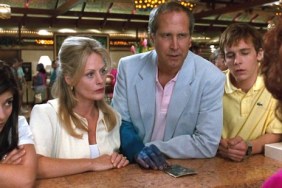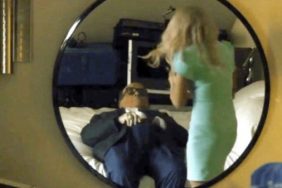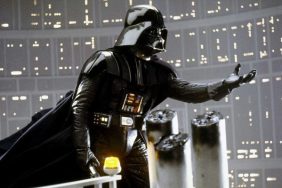It’s a bold new world of motion picture filmmaking, full of state of the art technology, and yet one of the best films of the summer was made by hand with stop-motion puppets and without a single line of dialogue.
Shaun the Sheep Movie, based on the popular television series, tells the story of a mischievous sheep whose plan to trick his Farmer into giving the flock the day off backfires spectacularly, stranding the animals in The Big City and The Farmer in the world of hipster poseurs who think the amnesiac’s sheep-shearing skills are the hottest new hairstyle trend. It is a non-stop barrages of sight gags and reversals of fortune, and that’s just the way directors Richard Starzak and Mark Burton like it.
Check Out: ‘Shaun the Sheep’ Review: A Shear Delight
We spoke to Starzak and Burton over the phone to learn more about the silent comedy stylings of Shaun the Sheep Movie, and to discover more about their creative process. Along the way we learn about some wild storylines and gags that didn’t make the final cut of the film, and their influences from classic comedy titans like Laurel and Hardy, Charlie Chaplin, and Jacques Tati.
Shaun the Sheep Movie opens in America on August 7, 2015.

Crave: I myself, and I suspect along with some other people in your American audience, am not familiar with the Shaun the Sheep TV series. I know him from the Wallace & Gromit cartoons. To start with, how are they connected? Is it a prequel?
Richard Starzak: [Laughs.] Yeah, possibly. [We’re] going to have to go home and think about that. We’ll call you back. Shaun was originally in just one Wallace & Gromit short, A Close Shave. He’s on screen for about six minutes, but we were aware from his appearance in there that Shaun was going to be a very popular character. So several years later we decided to develop this TV series.
Mark Burton: It’s not quite like the Marvel Universe where everything is interconnected. I think Richard developed the series from the cast that came out of A Close Shave, and I think it’s kind of a reset there. Wasn’t it, a little bit, maybe?
Richard Starzak: Yes, Shaun in the TV series is like a ten-year-old boy, whereas originally in the Wallace & Gromit short he was very much a newborn lamb.
So this is an “alternate reality,” we would say?
Richard Starzak: Yeah.
Mark Burton: A parallel universe of Mossy Bottom Farm. I think, just to be clear, that everything in the movie works with the series. Maybe it doesn’t tie in… well, you know it could tie in with what happens in A Close Shave. We just didn’t really go there. We were thinking more from the point of view of the series, I think.

I know this comes from the series, but tell me about the decision to tell the entire story – even with the human characters – without dialogue. Are you just big fans of silent cinema, or did this come from somewhere else?
Richard Starzak: Well we wanted to stick to what we’d done on the TV series. It would have been very strange for fans of the show if there was dialogue. I mean, we did discuss whether secondary characters could speak or whatever but I’m kind of glad we stuck to the integrity of the show and made a silent comedy. Because yes, we are big fans of silent era films and in fact it’s just a great way of storytelling, a purely cinematic way of storytelling. So we kind of relished that challenge.
It does seem like a huge challenge. Dialogue can be a crutch for some filmmakers, but without being able to use it as a backup were there any parts of the script or the film that were particularly hard to conceptualize or put together?
Mark Burton: Yes, I think plot-wise we had a couple of awkward moments. In the end we kind of resorted to… we cheated a little bit. We had things written down, like “Memory Loss,” and I think we had, when Shaun had to explain a plan, there was a [board], writing things on it, diagrams. But actually on the whole those that was just logistics. I think that what we found, actually, was that telling a story without dialogue was quite liberating in a way, because we knew we couldn’t have a complex plot. So we knew we had to work very hard on the emotional story and on the humor.

Were there any particular silent films, or other media, books even, that were an influence on Shaun the Sheep, either the series or the movies?
Richard Starzak: On the series, the strange thing is… I wrote an episode for Shaun the series called “The Boat,” and a few months after we finished it we were doing this research on Laurel and Hardy films, [and I] realized that I’d almost reshot an episode of Laurel and Hardy where they find a boat. So it must have subconsciously been in my brain…
Mark Burton: Cryptomnesia.
Richard Starzak: Cryptomnesia? Yeah, I thought it was my idea but it wasn’t. Yeah, not any specific movies but I think there are scenes in both Charlie Chaplin and Laurel and Hardy where they have that comedy of manners about being in a restaurant and the awkwardness of maybe not being able to pay, or spilling your soup on the next door neighbor. I mean, that kind of thing.
Mark Burton: There’s another director we talk a lot about called Jacques Tati. He’s a Belgian director. His films were silent comedies with sound, if that makes sense. So he would use sound. He had dialogue but they weren’t in the interest of the narrative. They were sound effects. He’d use sound as a comedy element. And he would often do this thing where he would kind of lock the camera off and have lots of things happening in front of the camera, people coming and going. We used a little bit of that. There’s a long shot where Bitzer goes into the hospital where the door makes a noise. He comes in and he comes out and he comes back in again, he has a bit of an altercation with a security guard. I think that was influenced by the Jacques Tati approach to things.

The plot of this begins very straightforwardly, with the sheep simply wanting to have a day off, and then everything careens outward. There’s an infinite number of possibilities you could have with that plotline. What cracked it? Was it the memory loss plot or another element that this whole movie hinges on?
Mark Burton: In terms of the route we went, our hope is that it hinges, in the end, when you decide what’s at the heart of this movie. And the heart of this movie is kind of family metaphor, I guess, about how sometimes we take for granted what we have in life and the people we have in life. And then growing in there if you want to find it is a kind of father and son thing with the Farmer as the absent father figure, and Shaun as a kind mischievous son, and they have to reconnect. We knew we wanted it to be a simple quest, they need to get the farmer back, and I think the memory loss thing, when we hit on that, gave us a way of exploring the farmer’s story, which was funny. We thought it was funny that he takes his farming skills into a kind of hipster city world, but also it had a nice resonance. In a way, again, you can see a kind of metaphor there about him being absent as a personality, and the need to reconnect with his farm. So I guess once we had that it felt like we could build a story around those elements.
I want to ask you about the wonderful jail sequence, particularly the dog with the crazy eyes. That is never not funny, and I’m curious where that joke came from.
Mark Burton: Actually I think in that case it was in the script. I don’t really know where… I know that we wrote it, but I can’t remember. There are a lot of jokes that come out of the storyboarding process and so on, and I’m trying to think what triggered that.
Richard Starzak: There’s just something funny about… We were talking about a kind of subconscious fear, that if you get put in prison you’ll be put in a cell with a mass murderer.

Mark Burton: A pscyho, yeah.
Richard Starzak: It was that kind of idea, I suppose.
Mark Burton: I remember acting it out for Richard, and he knew what this dog was like. We have lot – by the way – in the U.K. we have a lot of pit bulls. We have a lot of pit bull terriers and they’re quite grim-looking dogs. They’ve got a bit of a look to them. You don’t want to look them in the eye when they go past, you know. Maybe I was a bit influenced by that, I think. And then we talked it through. Where the comedy comes from in that little sequence, actually, is the way Bitzer reacts. I think that’s us, ordinary people, when some guy gives you a bit of a look on the tube or something. The way he can’t look away and you can’t look at him back. I think that was an observation comedy about middle-class people I guess. It’s a very unusual joke. Actually the shot of the dog is the same shot. He never moves. We just shot it for like a second, and the joke is we just dropped it in various places, and so it’s a really interesting test joke. It really worked with audiences. I think we’re delighted because it’s quite an unusual gag, I have to say.
Richard Starzak: It’s a good joke with animators as well, because it’s nice to get a great gag that doesn’t require any animation.
Do you have a particular gag that is your favorite, or that has a particular story behind it that you think is fun or interesting?
Richard Starzak: That’s a good question. Personally […] I love the restaurant sequence because it’s just that comedy of manners, how uncomfortable it is to be in a high class restaurant and trying to do the right thing. I had a lot of enjoyment with that.

Mark Burton: We came up with this whole idea of the animals copying the humans and that getting out of control. That felt like a really strong joke. I really love that joke as well. And the other one for me is in the hospital. There’s some kind of absurd farce. it’s that thing were you create a set of elements where each element in themselves leads you to that place where you believe each moment, so you can end up believing that a dog would dress up as a surgeon and get caught in an operation and have to carry on and pretend to be a surgeon. So you’ve got to believe, you’ve got to buy into it. It took a lot of hard work to get to that place. It always feels like that’s a fun one.
Richard Starzak: I love it as well because it’s quite dark, really, the idea of a dog operating on a human. And then chewing the leg of a skeleton. It’s quite dark if you think about it too much.
Was there ever a moment while you were working in Shaun the Sheep Movie when you were working on a joke, or a gag, that went too far? Maybe it was too dark, or maybe it was too broad?
Mark Burton: Yeah, I think all the time.
Richard Starzak: That was the process. All the time. The other thing that happens is…
Mark Burton: If you work on a joke and you agree it’s not funny, the jokes just don’t work, or it wasn’t right, but what’s harder is when you have jokes that work and there was no place for them because the pace of the story required that that joke got out of the way so the story could keep moving. There were a couple of places that we dropped some good jokes. We just had to drop them. They had been animated. It’s tough but it’s better for the whole process.

Are those jokes things that you could use again someday, or is there one you could tell me about now?
Mark Burton: Actually one of them, just a quite specific example of a gag, which ended up in the trailer, was the sheep in the city and they see a sign that’s a happy sheep. And they go, “Oh look! That’s great! They love sheep in the city!” and then it’s a neon sign that changes to a kebab. It’s like a cooked sheep basically, and then they realize that they eat sheep and they all run off. There was a number of issues with it but we stuck it in the trailer. It works very well as a standalone gag. It sets up the idea of sheep in the city. But it’s actually not in the film.
I know these movies take a long time to make but are there thoughts already about another film for Shaun the Sheep? Another cinematic adventure? Or is he going back to TV?
Richard Starzak: No, we’ve actually – since the film’s finished – we’re doing a half-hour Christmas special with The Farmer’s Llamas for TV. But yes, we’re definitely thinking, looking at ideas for a sequel at the moment.
So it’s still just in the idea phase then?
Richard Starzak: Well yes, we’re trying to work… again, the difficult bit is finding a story we can tell with no dialogue.

Were there any story ideas that you thought about for Shaun the Sheep Movie that just didn’t work, that were not conducive and were eventually abandoned?
Richard Starzak: Yes…
Mark Burton: There was early on…
Richard Starzak: There was, yes, early on. One of my favorites, probably the darkest one, was the Farmer ends up in the city. He ends up naked and he hides in this suit of armor in an antique shop, which is then bought by Prince Charles and given to the Queen for her birthday.
Mark Burton: I remember that…
Richard Starzak: And then in the middle of the night the Farmer gets out of the suit of armor and tries to climb out the window, and the light goes on. He’s basically naked there in the Queen’s bedroom, standing on her bed, trying to get out of the window. So that maybe that was a bit too dark.
Mark Burton: There was the whole thing about the oil rig, wasn’t there?
Richard Starzak: Oh yeah, we did the old thing about the Farmer discovering oil. Yeah, we tried lots of different roads to this story…
Mark Burton: You always end up going down a few cul-de-sacs. That’s just the way it is, really.

What do you think is the enduring appeal of Shaun the Sheep? He’s a wonderful character, but if you had to nail it down what do you think it is that people connect to the most?
Richard Starzak: Personally I think it’s a couple things. One is that slapstick humor, which is completely universal. Shaun plays in so many territories now and they all laugh at the same places, which is good. […] Also just the relationship between the characters. I think that’s a universal theme as well. Even though they might be Brits, they’re not very British. The themes are very universal so I think that’s what people identify with.
Mark Burton: I would also say that there’s a secret world of sheep, and the humans don’t know what sheep are up to, and the sheep are cleverer than the humans. I think kids can relate to that because it’s like them getting a one-up on adults. The secret world of kids. Adults don’t know what kids get up to, so I think there’s a sort of [appeal] to kids for that.
That’s true and yet that wonderful universality to the storytelling applies to adults as well. I don’t think there’s anyone who could look at Shaun the Sheep and go, “Well that’s clearly not for me.” Is that intentional, or do you think that’s just adults accessing their inner child?
Richard Starzak: That’s an interesting one. That’s a good question. I think everything we make at Aardman we tend to approach as just not condescending to kids. We just try to make ourselves laugh. Therefore we’re disposed to making comedy. I think that sticking to that idea is kind of what makes it work for me.
Images via Aardman Animation/StudioCanal
William Bibbiani (everyone calls him ‘Bibbs’) is Crave’s film content editor and critic. You can hear him every week on The B-Movies Podcast and watch him on two weekly YouTube series: Most Craved and What the Flick. Follow his rantings on Twitter at @WilliamBibbiani.






